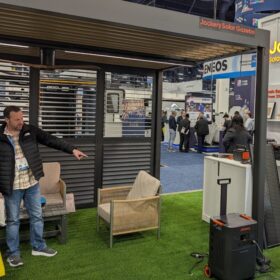Reactivate and WM collaborate to convert former landfill sites to solar
The partnership aims to develop community solar, small utility-scale solar and energy storage projects on 50 or more of WM’s capped landfill sites across the United States.
GameChange Solar launches distributed generation solar division
The company says it will provide dedicated solutions to commercial, industrial, and community solar projects nationwide..
South Carolina county court dismisses challenge to Silfab Solar manufacturing facility
A York County circuit court judge has dismissed a resident-led lawsuit seeking to halt construction of Silfab’s PV module assembly plant, ruling that the plaintiff lacked standing and failed to exhaust administrative remedies.
Five trends for energy storage as global market passes 100 GW
A report from Wood Mackenzie identifies five key trends that will define the energy storage industry in 2026, including supply chain restructuring and the rise of non-lithium batteries.
Jackery releases 2 kW solar gazebo
Jackery continues to expand its product range beyond storage with a new 2 kW solar gazebo designed for creating outdoor space, starting with U.S. availability in 2026.
Elon Musk at WEF: SpaceX and Tesla to produce 100 GW each of PV per year in the U.S. this decade
Elon Musk targets 100 GW of annual solar manufacturing for both Tesla and SpaceX within three years to solve the energy bottleneck threatening the AI revolution.
Behind-the meter generation is scaling up to meet “hyperscale” demand
Pacifico’s Kevin Pratt says projects like the GW Ranch 7 GW microgrid point to where energy development is heading.
SEIA elects 2026 board members, taps Qcells’ Scott Moskowitz as board chair
Moskowitz succeeds former chair Darren Van’t Hof, who had assumed role as interim President and CEO; RWE’s Ingmar Ritzenhofen named vice chair.
Scanifly and IronRidge integrate drone designs with racking layouts
Contractors can now export solar panel placements from drone models into racking design software to automate bills of materials.
Department of Energy cuts $83 billion in loans, reversing energy transition funding
The Department of Energy moved to de-obligate or revise billions in financing for clean energy projects while prioritizing natural gas and nuclear power.












